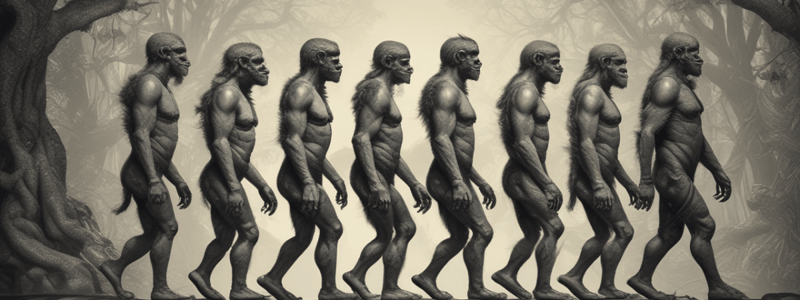Podcast
Questions and Answers
What is the approximate time period when Homo Sapiens first appeared?
What is the approximate time period when Homo Sapiens first appeared?
- 200,000 years ago (correct)
- 100,000 years ago
- 250,000 years ago
- 160,000 years ago
What is the purpose of humans spending about 20% of their time grooming or preening?
What is the purpose of humans spending about 20% of their time grooming or preening?
- To conserve energy
- To enhance physical appearance
- To release oxytocin and promote bonding (correct)
- To regulate body temperature
When did Homo Sapiens begin to develop language?
When did Homo Sapiens begin to develop language?
- 100,000 years ago
- 150,000 years ago
- 130,000 years ago (correct)
- 200,000 years ago
Why did Homo Sapiens develop language?
Why did Homo Sapiens develop language?
What is the primary inherited need of humans, according to the edited Maslow's Hierarchy of Needs?
What is the primary inherited need of humans, according to the edited Maslow's Hierarchy of Needs?
What happens to neurons if they can't communicate with other neurons?
What happens to neurons if they can't communicate with other neurons?
What significant change occurred in the human brain around 50,000 years ago?
What significant change occurred in the human brain around 50,000 years ago?
What cultural aspects of human society appeared around 50,000 years ago?
What cultural aspects of human society appeared around 50,000 years ago?
What is the reason behind the prefrontal cortex being easily distracted by something new?
What is the reason behind the prefrontal cortex being easily distracted by something new?
What happens to the information when students study and watch TV at the same time?
What happens to the information when students study and watch TV at the same time?
What is the role of mirror neurons in altruism?
What is the role of mirror neurons in altruism?
What is the relationship between emotions and rational thinking in our decision-making process?
What is the relationship between emotions and rational thinking in our decision-making process?
What is the main characteristic of the neural conduits for transmitting emotional information?
What is the main characteristic of the neural conduits for transmitting emotional information?
What is the role of the hippocampus in the learning process?
What is the role of the hippocampus in the learning process?
What is the significance of 1500 cubic centimeters in the context of brain size?
What is the significance of 1500 cubic centimeters in the context of brain size?
What is the implication of the statement 'I am a Canadian hipster man'?
What is the implication of the statement 'I am a Canadian hipster man'?
What is the nature of all human experience according to the text?
What is the nature of all human experience according to the text?
What is one of the key factors that contributed to the decrease in brain size over time?
What is one of the key factors that contributed to the decrease in brain size over time?
Where is the earliest known written language, Sumerian, from?
Where is the earliest known written language, Sumerian, from?
What is the result of multitasking on the brain, according to Earl Miller?
What is the result of multitasking on the brain, according to Earl Miller?
What is the name of the hormone that is increased when multitasking, leading to mental fog or scrambled thinking?
What is the name of the hormone that is increased when multitasking, leading to mental fog or scrambled thinking?
What is the result of multitasking on the brain's reward system?
What is the result of multitasking on the brain's reward system?
What is the significance of the 'Soccer War' between Honduras and El Salvador in 1969?
What is the significance of the 'Soccer War' between Honduras and El Salvador in 1969?
What is the main reason why individuals who were not able to survive by their wits alone could scrape by with the help of others?
What is the main reason why individuals who were not able to survive by their wits alone could scrape by with the help of others?
Flashcards are hidden until you start studying
Study Notes
The Evolution of a Social Animal
- Homo sapiens appeared around 200,000 years ago, with big brains, and groups slowly got bigger.
- Humans spend about 20% of their time grooming or preening, which releases oxytocin, the "love" or bonding hormone.
- This bonding is not genetic, but arises through touch and communication.
The Emergence of Language
- Around 130,000 years ago, some Homo sapiens began to talk, using simple, descriptive language.
- The need for more efficient "preening" or "grooming" led to the development of communication.
- Language became a primary inherited need, as even well-nourished human babies die without social interaction.
The Brain's Adaptation to Sociality
- Around 50,000 years ago, the brain changed its wiring to better process complicated social information.
- Cultural aspects of human society, such as music, abstract thought, and symbolic cave art, emerged.
The Shrinking Brain
- Around 20,000 years ago, the brain began to shrink from 1500 cubic centimeters to below 1400cc.
- Reasons for this include specialization and networked thought, as people didn't have to be as smart to survive in complex societies.
- Multitasking is making us stupid, as it increases the production of stress hormones and causes mental fog.
Inherited Social Traits
- We inherited biological traits, such as empathy, altruism, sense of equality, and sense of morality and fairness.
- Mirror neurons help us achieve altruism by feeling sensations that others feel.
- Emotions are a key aspect of human decision-making, with neural conduits for transmitting emotional information being faster than rational thought.
Studying That Suits You
Use AI to generate personalized quizzes and flashcards to suit your learning preferences.




